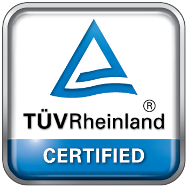

Yes, a piece of Electrifying news to all our EV Executive Diploma course aspirants and enrollees. We are happy to announce that our Executive Diploma Course on EV is a step ahead on the global stage with recognition from a reputed independent certification body. Furthermore, as we advance, the EV Executive diploma course from Cloudkampus is now recognized by TÜV Rheinland.
What does a PersCert TÜV Certification by TUV Rheinland mean?
TUV group has an independent association that tests, inspects and certifies products, technologies, systems and people to ensure quality and set benchmark standards. TÜV Rheinland Certificates are recognized worldwide and carry the trademark of trust and quality.
TÜV Rheinland Certification Benefits for Students
The EV industry is booming worldwide, and at this juncture, overseas job opportunities can be career-changing. You can now explore unlimited career options abroad with your PersCert TÜV certification.
Acclaimed Seal of Trust
The proof of your competence certified by PersCert TÜV will make every organization’s head turn.
Assured Quality
Every organization would be confident enough to hire you and use your expertise for their growth.
Competitive Advantage
The certification from PersCert TÜV gives you the edge over your peers to advance your career in the EV industry.
The Executive Diploma in Embedded Systems is a specialized program tailored for professionals keen on mastering embedded systems and software engineering. This course is ideal for engineers aiming to innovate in intelligent system design and it bridges the gap between theoretical knowledge and practical application. With the embedded systems market projected to reach $116 billion by 2025, growing at a CAGR of 6.1%, its significance in sectors like aerospace, automotive, and industrial automation is more pronounced than ever.
This course aims to thoroughly equip participants with the skills and knowledge necessary for excelling in embedded systems. It focuses on the holistic development of expertise in designing, developing, and implementing embedded hardware and software. The curriculum is carefully crafted to deepen understanding of intelligent systems integral to various industries, blending theoretical learning with hands-on experience and project work. This approach ensures participants are well-prepared to navigate and contribute significantly to the evolving landscape of embedded systems and software engineering.
Embedded C - Industrial Temperature Monitoring and Analysis System
10 Hrs
C++ - Advanced Inventory Management System with Interprocess Communication
10 Hrs
IOT - Develop a Smart Health Monitoring System (SHMS)
10 Hrs
RTOS - Develop a Multi-Priority Alarm System (MPAS) that utilizes interrupt-driven alarms
10 Hrs
Embedded Linux - Develop a Real-Time System Monitoring Dashboard (RSMD)
10 Hrs
PIC Microcontroller - Develop an intelligent Automotive Door Monitoring control System (DMS) and Using CANBUS
10 Hrs
© 2026 CloudKampus. All rights reserved.